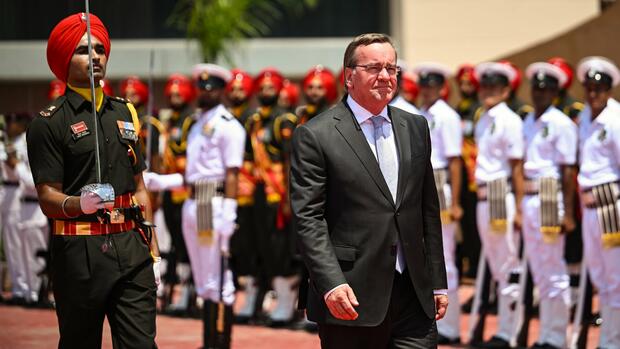Bangkok Defense Minister Boris Pistorius made an impression during his visit to India: “His passion for yoga is commendable,” wrote his Indian counterpart Rajnath Singh on Twitter after meeting the SPD politician.
Pistorius did not come to New Delhi to impress with body art, but with military technology: He is promoting a multi-billion dollar deal with the German defense industry in the world’s most populous country.
The Federal Government also hopes that a possible cooperation will take an important step towards helping India to free itself from its military dependence on Russia.
Specifically, it is about six submarines with a conventional diesel-electric drive, for which India’s Navy wants to spend the equivalent of around five billion euros. They are to be manufactured in cooperation with one of two Indian companies that have already been selected.
Of the five companies originally shortlisted by the Indian government, only two are now considered promising foreign technology partners: Daewoo Shipbuilding from South Korea and the Kiel-based German manufacturer Thyssen-Krupp Marine Systems (TKMS).
“It would be a big order that would go to German industry,” Pistorius said at the start of his visit in an interview with ARD. India also benefits from the deal and a strategic partnership, the minister added.
He himself has no contracts in this regard – these are not concluded between the governments, but directly with the companies involved. “I’m here to accompany and support that,” said Pistorius.
Submarine MoU to be signed on Wednesday
According to information from the Handelsblatt, TKMS is planning to sign a letter of intent with the Indian shipyard Mazagon Dock Shipbuilders in Mumbai on Wednesday in the presence of Pistorius. This should state that both companies would jointly produce the submarines desired by India should they be awarded the contract by the government. TKMS declined to comment on the plans. Pistorius spoke of a possible flagship project.
Mazagon Dock Shipbuilders is one of two local companies shortlisted by India’s Ministry of Defense for the submarine plan. The second manufacturer on the shortlist is L&T Shipbuilding, which now has to look for another international partner.
Germany wants to help India to free itself from dependence on Russia for armaments.
(Photo: dpa)
The Spanish manufacturer Navantia had also shown interest in the project – according to Indian media reports, however, it does not meet all of the technical requirements that India places on the future partner.
The French Naval Group, which was also in the government’s shortlist, has already withdrawn. The Russian manufacturer Rosoboronexport is also reportedly no longer available for the project.
India is the world’s largest arms importer – and Russia has been its most important supplier for decades. In the past five years, Russian manufacturers have had a 45 percent market share in the country, according to the Sipri research institute.
Dependence on Russian arms in India, which feels threatened by both China and Pakistan in its neighborhood, is considered a major reason why the New Delhi government has so far not clearly condemned Russia’s war of aggression in Ukraine.
The US is also expanding military cooperation with India
Western countries that see India as a strategic partner in Asia are now trying to position themselves as alternative military partners. Before Pistorius, US Secretary of Defense Lloyd Austin was a guest in New Delhi on Monday.
>> Read here: India’s friendship with Russia threatens the West’s Asia strategy
During the visit, the two countries agreed on a roadmap for increased cooperation in the defense industry. A day later, the German Defense Minister praised India’s “very sustained” attempts to “significantly and quickly reduce” its dependence on Russia for armaments.
Pistorius promised the country fundamental simplifications when buying weapons and equipment from Germany: “India is an important, not to say the most important, strategic partner for Europe and also for Germany,” he said. The country must be treated accordingly. It is possible to deal with India in the same way as with Australia and Japan in the future – the two countries can buy from German armaments companies without complex approval processes.
The Indian shipyard is to sign a contract with Thyssen-Krupp Marine Systems.
(Photo: IMAGO/ZUMA Wire)
The federal government also spoke out in favor of German armaments companies becoming more involved in India – but the companies were not offered any active help.
Pistorius: We have to accept India’s proximity to Russia
Pistorius does not see the fact that India is not clearly on the side of the West with regard to the Ukraine war and sticking to its strategic partnership with Russia as an obstacle.
>> Read here: India – The Russian oil business is doing better than ever
When asked about India’s extensive oil deals with Russia, Pistorius said: “Of course that’s not entirely okay.” But as partners, you can’t blame each other for everything that’s not optimal. “The fact that there are dependencies that influence behavior is obvious, we have to deal with that,” he said.
The minister is also self-critical with regard to India’s historical proximity to Russia: “Perhaps we have to admit that we were not close enough in the past.”
On his trip to Asia, India is the third and final stop for Pistorius after a visit to the Shangri-La Dialog security conference in Singapore and a visit to his Indonesian counterpart Prabowo Subianto in Jakarta.
There, too, he promoted German armaments: “We talked about the possibility of perhaps doing a submarine business,” he said. Prabowo, who is running for the presidency in Indonesia in next year’s election, called the talks “very productive”.
Collaboration: Martin Murphy
More: India’s Rise – Why the country can now only jeopardize its own success
